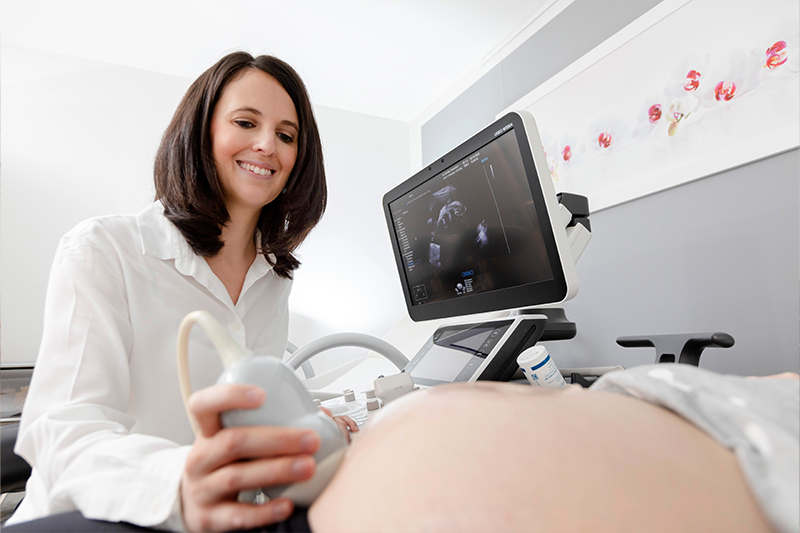Obstetrics
For us it is one of the most beautiful tasks to be able to accompany a woman during her pregnancy and to provide advice. Due to our many years of experience in very large maternity clinics and additional qualifications, we are able to provide competent care even in special and difficult situations.
Pregnancy consultation
An exciting time is about to begin, as a little person is growing inside you. In personal consultations, we will advise you in detail and accompany you through the time of pregnancy. We support you in influencing your pregnancy in a positive way.
High-risk pregnancies
There are many different reasons why a high-risk pregnancy may be present. Sometimes it is because of the mother's age or due to pre-existing conditions or complications from previous pregnancies. In such cases, we provide more intensive care with additional examinations to help guide you safely through this time. Mehrlingsschwangerschaf
Multiple pregnancies
Twins or even triplets are very special for the parents. And these pregnancies are also given special care by us. At the beginning, it must be determined whether each child has its own placenta or both share one. If the children share a placenta, the pregnancy must be managed more closely and signs of twin transfusion syndrome must be watched for.
Non-invasive prenatal testing (NIPT)
By taking a blood sample from the mother, an examination for the most common chromosomal disorders of the child can be performed. We will be happy to advise you on these tests and we will find out together whether this examination makes sense for you.
Early organ ultrasound / first trimester screening
Most of the fetus's organs can already be visualised in this early phase (12th to 14th week of pregnancy). Nevertheless, some malformations may not be visible on ultrasound or may only be visible later. The so-called first trimester screening is an individual risk calculation of the probability of the most common trisomies in the fetus. This is a combination of maternal factors, markers in the ultrasound (including measurement of the nuchal fold) and a blood test. In addition, the blood flow in the artery leading to the uterus (uterine artery) can be measured at this time to assess the risk of pre-eclampsia.
Preeclampsia
Preeclampsia is a serious complication of pregnancy. It can occur in the second half of pregnancy and is associated with high blood pressure. Symptoms may include headaches, visual disturbances and dizziness. Sudden severe weight gain, swollen hands and feet may also be clues. During our consultations we check for signs of preeclampsia. This allows us to take necessary measures at an early stage.
Extended screening for gestational diabetes
Gestational diabetes is one of the most common complications of pregnancy. In order to reliably detect this risk and thus avoid risks for the child, extended screening for gestational diabetes is recommended.
Clarification of the immune status in pregnancy
Comprehensive prenatal care also includes clarification of the immune status of the pregnant woman. For this purpose, we offer various tests and examinations.
Childbirth
We discuss your questions, ideas and possible fears about childbirth with you. We will also be happy to advise you individually on the mode of birth and place of delivery.
Ultrasound examinations during pregnancy
Every pregnant woman is entitled to three ultrasound examinations according to the maternity guidelines. During the first ultrasound (9th-12th week of pregnancy), the pregnancy is confirmed and it is determined whether it is a singleton or multiple pregnancy. Between the 19th and 22nd week of pregnancy, the second ultrasound is performed. The weight of the baby is estimated, the position of the placenta is checked and certain organs of the baby are examined. The third ultrasound (29 - 32 weeks) is used to measure the fetus to check whether growth is regular. Additional ultrasound examinations may be necessary in case of complaints or risks.
Early organ ultrasound / first trimester screening
Most of the fetus's organs can already be visualised in this early phase (12th to 14th week of pregnancy). Nevertheless, some malformations may not be visible on ultrasound or may only be visible later. The so-called first trimester screening is an individual risk calculation of the probability of the most common trisomies in the fetus. This is a combination of maternal factors, markers in the ultrasound (including measurement of the nuchal fold) and a blood test. In addition, the blood flow in the artery leading to the uterus (uterine artery) can be measured at this time to assess the risk of pre-eclampsia.
Doppler sonography
During Doppler sonographie, the mother's vessels leading to the uterus can be examined. This can provide information about the perfusion to the placenta during pregnancy. The blood flow in the umbilical artery and in other vessels of the child is measured to get information about the supply of the child.
Ultrasound scan for fetal anatomy /anomaly
Ultrasound scan for fetal anomaly is also known as major organ screening. With this ultrasound procedure, we can look at the child's organ development and detect possible anomalies. Here, too, it is not possible to completely exclude malformations and chromosomal disorders. If there is an indication, the health insurance companies cover the costs of the examination. However, it can also be ordered as a self-pay service. In case of abnormalities or malformations, we work together with the practices for prenatal medicine in Düsseldorf.
3D/-4D Ultrasound
With 3D-4D ultrasound, organs and body parts of the unborn child can be displayed spatially. The movements of your child and the facial expression can also be viewed.
Echocardiography
Echocardiography is an ultrasound examination (sonography) of the heart. It is used to detect heart defects in the child during pregnancy.



